

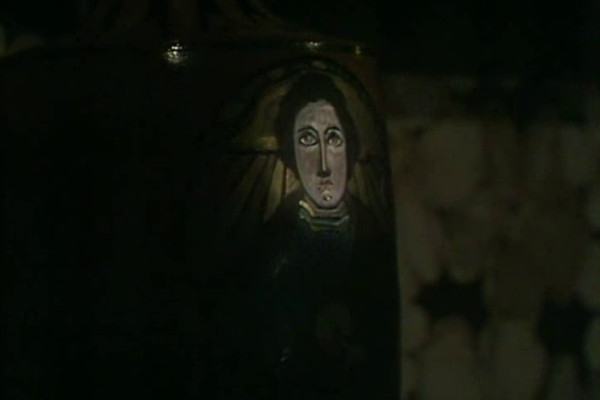
Shadows was very much an anthology series in the strictest sense, with 15 of its 20 episodes written by individual writers, and the directing duties shared amongst 11 people.
Ewart Alexander was the most "prolific" writer for the series, crafting one episode for every season. The Eye ties with their season one script After School in featuring the smallest cast, with just three actors - "the Greeks" next door unseen.
Almost like a proto Sapphire & Steel, objects from the past cause apparitions to appear, as well as what could be described as poltergeist activity. Sadly, it's not quite as gripping as such a description may make it sound, and, despite some pulsing sound effects and inanimate objects moving by themselves, the narrative is too undeveloped for it to really engage.
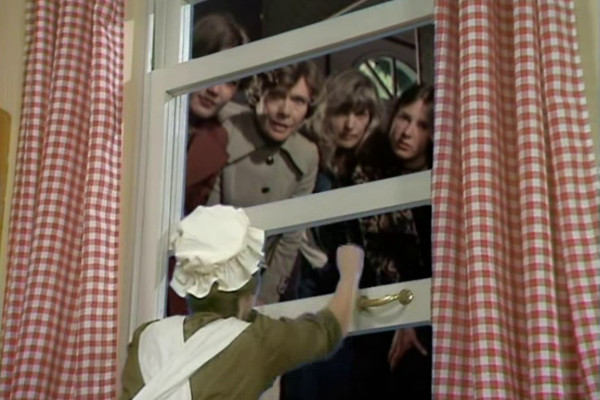
Time Out Of Mind is a good episode, featuring an imaginative girl who gets trapped in a doll's house, in a tale that's somewhat reminiscent of The Twilight Zone episode Miniature. The reason why it ranks so low here is simply that, for a supernatural horror series, it simply isn't scary at all, nor does it try to be.
The concept of Shadows episodes not being scary is a narrative that's repeated more than once throughout this article, and it's one that shies away from abject praise, being one of the most critical articles this site has ran. While the series certainly isn't bad, it hasn't aged particularly well, and studying television in context of the time it was made illustrates how tame the programme really was: five months after this episode aired, ITV screened Children of the Stones.
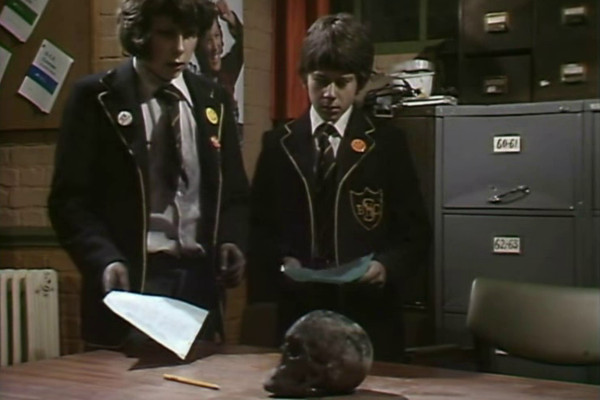
The story of After School - the dead spirit of a boy in a mine wants some schoolkids to dig up his skull so he can rest in peace - is suitably macabre, but is sadly cheap, with wobbly sets and the focal point of the skull at the climax covered by a boom mike shadow all over it.
Most importantly of all, though, it's held back from greatness by the two leads, two young child actors who sadly don't convince. The world of cult television, particularly cult television aimed at children in the 1970s, is often littered with sub-par acting. While it's not nice to criticise the acting credentials of people trying their best, such things are par for the course for any old-school fantasy fan, where half of the Tomorrow People seemed to have jaunted out of Equity, and even "prestige" shows of the type, such as Doctor Who, had guest stars like Rick James, or regular cast members like Matthew Waterhouse.
Having two inexperienced actors carry the entire episode simply doesn't work, with first-credited Gareth Thomas not appearing after the first four-and-a-half minutes. Season one of Shadows deserves much credit for daring to try, and was probably a lot better received at the time... but, unlike many of the series covered in these "Worst To Best" articles, it hasn't aged very well, and would fail to grab young audiences in the modern age.
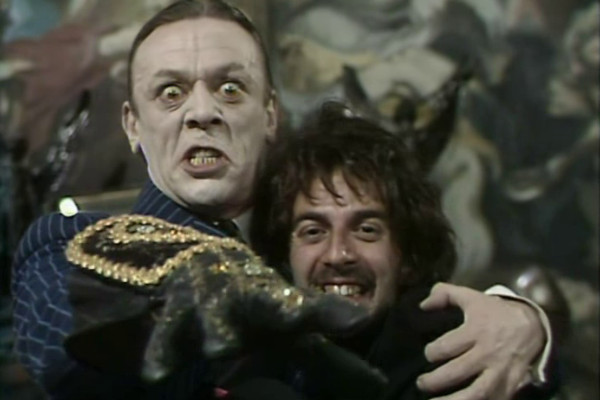
The second season of Ace Of Wands opened with Seven Serpents, Sulphur and Salt, a now wiped story, of which only low-quality audio copies still exist. A story which introduced the villainous Mr. Stabs, played by Russell Hunter, a character who was reprised twice, and, possibly uniquely, in two different shows. He last reappeared in a 1984 episode of Dramarama, played by David Jason, 13 years after his first appearance.
This 1975 tale was his first comeback, a camp, farcical comedy episode, with some possibly adult material - just why is Sir Arthur Inchwood wearing a skeleton costume when he's in bed? - it's an episode that goes away from fear and into something with extra levels. Silly, sure, and broadly played, but Trevor Preston's scripts are always engaging, despite it all. The plot, featuring a man being taken over by the persona of a dead gangster when he tries on his shoes, had already been done before in Dead Man's Shoes, a Twilight Zone episode. However, in execution it's more like the silliest Randall and Hopkirk (Deceased) episode Murder Ain't What it Used to Be!
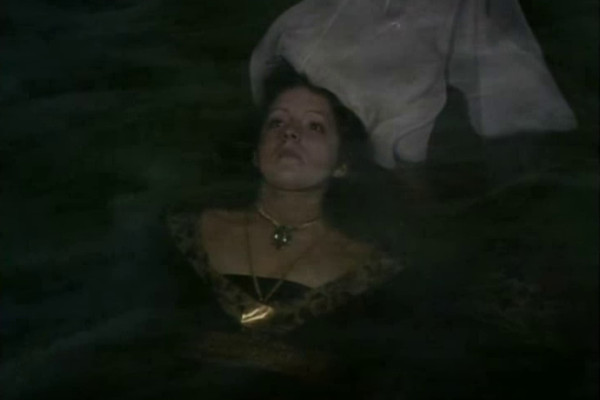
Pauline Quirke stars alongside Richard Willis, a child actor perhaps best known to this site's demographic as Varsh from the Doctor Who story Full Circle. Sadly, they're joined by Susan Pariss, an actress with no other credits who does hold back the quality of the episode. Final scenes with Pariss having a spiritual drowning, as pictured, are quite effective, but again this is one held back by the lack of experience of some cast members.
Of note is some of the antiquated devices and dialogue which seems anathema today... Quirke at one point indulges in a "silent conversation" in the background when we should be able to hear her, while Parriss can be described as feeling "a bit queer" without it having any reference to homophobic slurs. Times change, and while a series over forty years old shouldn't be judged on modern terms, it does create an unfortunate barrier between it and an audience of 2018.
Lovers of trivia might note that the episode is given a slightly different title in the end credits, being listed as "An Optical Illusion"... unless I'm just seeing things...
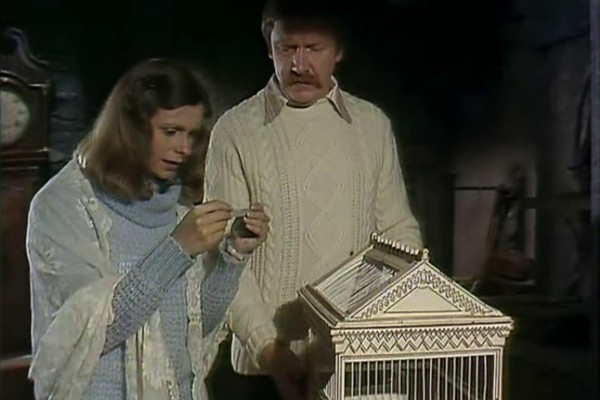
Eleven O'Clock marks the start of genuinely decent episodes of Shadows, a well-meaning series that does often fail to live up to its intentions. While somewhat bogged down by cod French accents, the two central actors here take it all very seriously and are committed to their parts. Featuring a haunted clock, the spirit of a dead soldier and the notion of "time" playing tricks, it's all very Sapphire & Steel before that series was even thought of, even though it lacks that series' class...
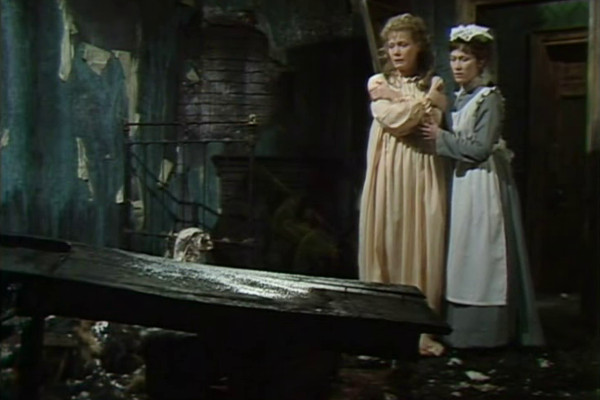
The opening episode, like the very best of the series, it refuses to talk down to its audience, with very little about it screaming out "kid's show". Yet while a strong opener, it does have a meandering quality, not really getting out of first gear, and it doesn't really catch fire, unlike the hotel in the story. Featuring a Victorian nurse greeted by the apparition of a present-day girl, the end twist sees the realisation that she's a "ghost from the future". While all involved play their roles with conviction, perhaps a change of title was required to keep this "twist" concealed from viewers...